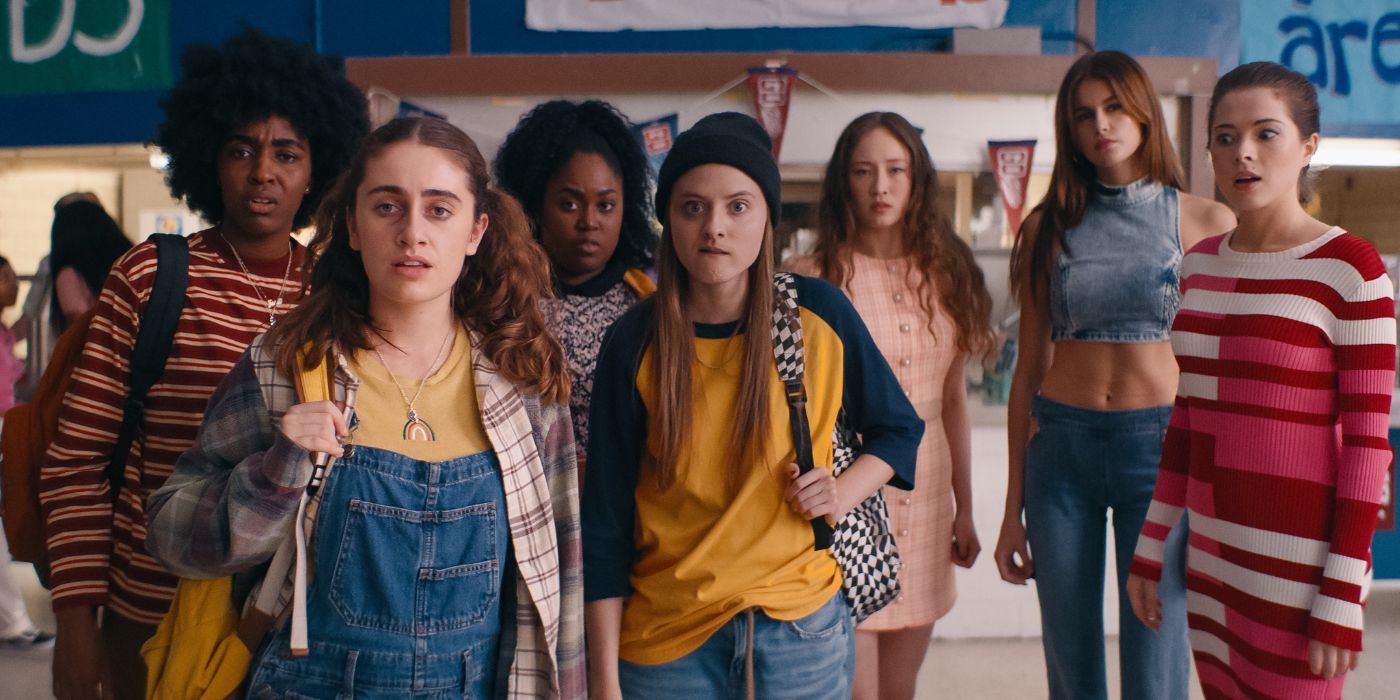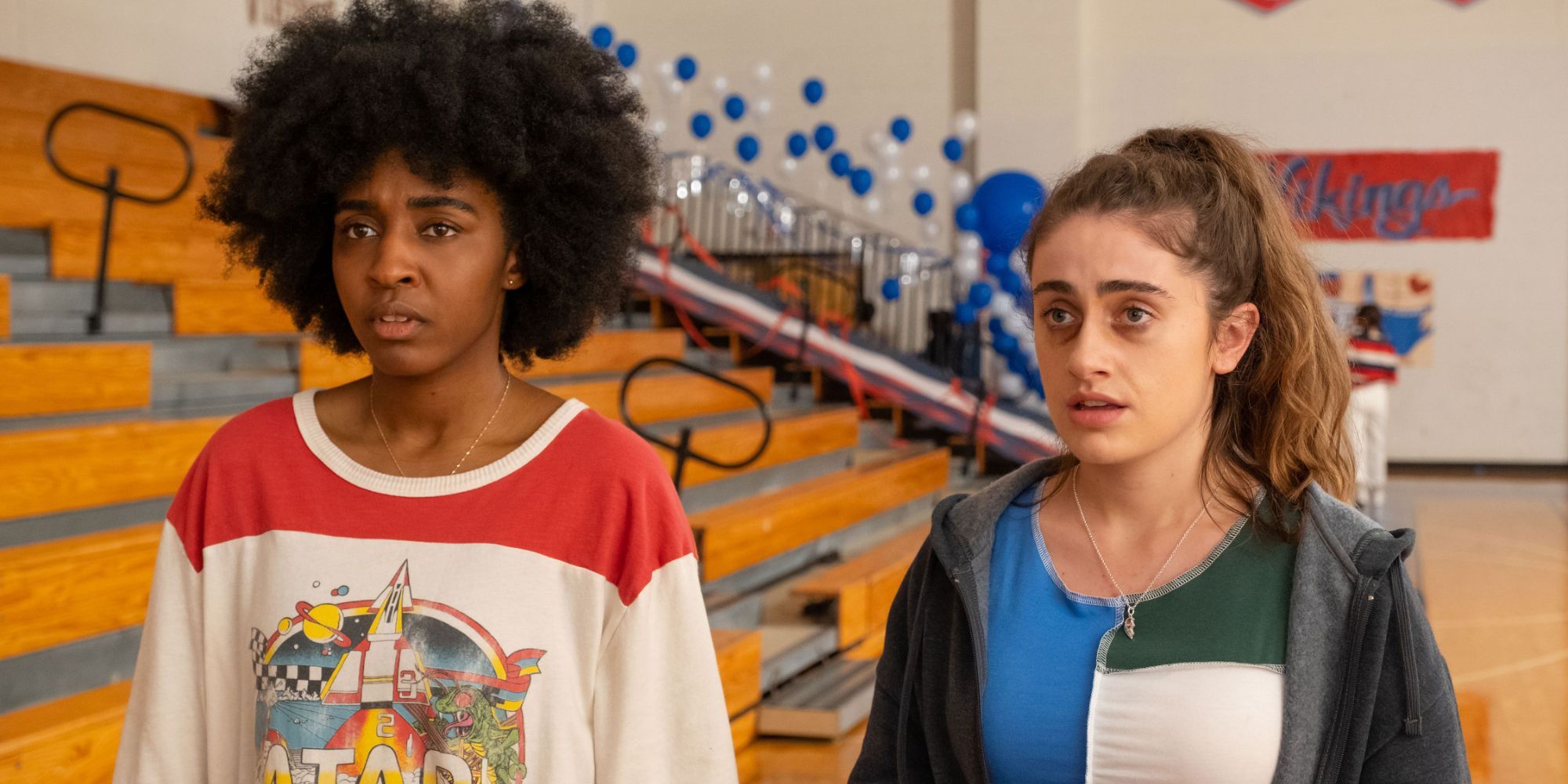In June 2014, Tasha Robinson lamented the state of women characters in then-modern blockbuster cinema. Specifically, Robinson’s excellent essay “We’re losing all our Strong Female Characters to Trinity Syndrome” on The Dissolve noticed that several blockbusters like How to Train Your Dragon 2 or The Hobbit: The Desolation of Smaug were happy to include one prominent powerful lady character but failed to give those ladies anything notable to do. They just became statues to support male characters in most instances, their supposed status as “strong” meant to compensate for the fact that they were just as narratively frivolous as classic women characters. Here and in other great pieces of writing, Robinson yearned for more interesting lady characters to show up in mainstream entertainment and it seems like Bottoms writer/director Emma Seligman has been too happy to oblige this kind of desire.
The works of Seligman, Shiva Baby, and Bottoms, are comedies focused on casts largely comprised of women, but there are no girlbosses here. The protagonists of Seligman’s movies are messy disasters who can barely brush their hair in the morning, let alone tackle all of the major personal problems in their respective lives. Best of all, the presence of such disastrous gals isn’t played off as something “shocking” or a gimmick. These figures are just part of equally messy realities, their flaws depicted as totally normal. Tired of ladies in cinema who say things like “why are men so messy?” in action movies or only exist to give men inspirational speeches in award-season biopics? Come into the world of Emma Seligman cinema, where recognizably human women are plentiful.
Rachel Sennott’s ‘Shiva Baby’ Character Is in an Extremely Tough Spot
For her debut feature-length directorial effort Shiva Baby, Emma Seligman came up with an ingenious comedic concept: have a protagonist attend a Shiva observance but focus on anything but the deceased. That premise revolves around Danielle (Rachel Sennott), whose life is in disarray and is now having to confront her immediate family and familiar figures in the local Jewish community at this event. Also there? Maya (Molly Gordon), the ex-girlfriend of Danielle, and Max (Danny Deferrari), the married man Danielle is currently sleeping with (he’s her sugar daddy). There’s lots of tension bubbling here and needless to say, Danielle isn’t very good at navigating all of that mayhem.
Danielle is a very pronounced introduction to Emma Seligman’s fascination with messy self-absorbed protagonists and an extremely entertaining manifestation of that kind of character at that. That’s partly because of Seligman’s witty writing, which gives Danielle such memorable lines as “Oh, you guys [in the photo] are at the Holocaust museum. You look so… happy!” while the camerawork from cinematographer Maria Rusche perfectly puts viewers into the frazzled mindset of this character. The point-of-view shots or cramped blocking really accentuate the way Danielle feels trapped navigating a bunch of falsehoods in such a buttoned-up social environment.
Emma Seligman’s Lead in ‘Shiva Baby’ Is Selfish, But She Isn’t a Villain
What’s best of all in Seligman’s writing for Shiva Baby, though, is that it doesn’t sensationalize Danielle being an imperfect person nor does it portray her as a “demon” for being selfish. Women are human beings. They’re capable of not always thinking about everyone else or being outright mean. These emotions or experiences can be expressed without suddenly turning that individual into a social pariah. Shiva Baby presenting Danielle’s deceptions without also using them as an excuse to make viewers immediately hate this protagonist is a lovely subtle touch. Plus, in the context of Shiva Baby’s “unlikeable” protagonist, Danielle functions as a “reclaiming” of sorts of the “depraved bisexual” archetype.
Pop culture has a tendency to portray bisexual individuals as being innately immoral, sexually insatiable, and unabashed villains. In Shiva Baby, Danielle is a bisexual gal with grave character defects, but that doesn’t make her a villain. Emma Seligman is crafting a character that reflects the real, nuanced nature of real-world bisexuals while declaring that bisexual characters don’t have to be paragons of virtue to lead movies. They can be flawed yet still get narratives centered around their lives. Within Shiva Baby’s brief 78-minute runtime, Emma Seligman manages to deliver plenty of impressive subversion of what a cinematic protagonist can look like. Male characters get to be monsters all the time and still be believable as people anchoring a major motion picture…why can’t the same courtesy be extended to bisexual Jewish ladies?
‘Bottoms’ Hilariously Explores Female Sexual Desires
There’s a delightfully anarchic energy to Emma Seligman’s second directorial effort, Bottoms, that heavily informs why this particular high school sex comedy is so hysterical. This farce is full of people who lie, cheat, blow up cars, and dismiss the idea of bomb threats. There are no conventionally likable characters to serve as an anchor for the audience nor is there ever any in-universe reason for why everything in the world of Bottoms is so absurd. Both of these qualities are such a welcome departure from the norms of modern R-rated comedy movies. Titles like Stuber and Tag put on airs of being “raunchy” and “rebellious,” but then spend too much of their runtime having their lead characters engage in schmaltzy talk about their backstories or character arcs. Even the poop and dicks-obsessed canines of Strays can’t just be rowdy critters prone to foul-mouthed antics. They need backstories lifted from Toy Story 2 and DC League of Super-Pets to explain why they’re so bawdy.
By contrast, Bottoms just lets protagonists PJ (Sennott) and Josie (Ayo Edebiri) be horny losers. There’s no larger or deeper personal reason for why they start a high school fight club beyond wanting to get some cheerleader action. Simple desires inform their selfish behavior and that makes them such fun and easily accessible characters. Plus, just letting them be flawed and often manipulate people makes the jokes of Bottoms all the more amusing to watch unfold. The script doesn’t need to pause to explain why PJ is so aggressive so that the audience “likes” her. She can just act selfishly or in an otherwise flawed fashion, which ensures there’s more room for absurdist gags.
‘Bottoms’ Lets Queer Characters Carve Their Own Destructive Path
Much like with Shiva Baby, there’s also a quietly subversive quality to Bottoms being anchored by such unlikable protagonists. For one thing, this is another Seligman feature headlined by queer women and once again, this writer/director has crafted a movie rebuking the idea that queer folks have to be “model citizens” to get movies made about them. In the past, there’s been a perception that queer folks on film need to be drained of their sexuality or flaws so that cis-het people can “accept” their presence on screen. Seligman throws that notion into the trash where it belongs. PJ and Josie are not puppets seeking the approval of privileged moviegoers. They’re messy and selfish lesbians that many queer moviegoers will recognize in themselves. Much like Danielle in Shiva Baby, PJ and Josie redefine viewer expectations for what kind of protagonists can headline motion pictures.
There’s also the fact that Bottoms is inhabiting the sex comedy genre, a realm largely dominated by male protagonists in the past. Needless to say, such lead characters often behaved in less than morally upstanding ways, with such transgressions often being dismissed under a “boys will be boys” attitude. Having PJ and Josie be such messy and self-absorbed people continues the default protagonist mold of the American sex comedy, but it also proves that, frankly, such characters are way funnier when depicted as queer women. There’s just more novelty in seeing gay gals being impulsive and dumb. Queer women being loud, obnoxious, and flawed has some specialness to it since societal pressures largely keep LGBTIQA+ ladies quiet in real life. Queer women watching Bottoms aren’t exactly wishing they could be selfish and manipulate people for sex (or at least they shouldn’t!) but Seligman’s unabashedly messy queer gal protagonists do function as wish fulfillment for these audience members.
Emma Seligman Is Right, We Don’t Need Likable Characters
“Likability is a jail” John Mulaney proclaimed in a memorable moment from his 2023 stand-up special Baby J. It’s a statement that will resonate as true for so many, including members of the LGBTQIA+ community. Within the first two movies in Emma Seligman’s filmography, though, this writer/director has thrown caution to the wind and any desire to have her lead characters be viewed as “likable” with it. Who needs likability? So many of the most famous fictional individuals in history are outright monsters, like Walter White or Hannibal Lecter. Surely the world can handle on-screen lesbians like Danielle, PJ, and Josie, who are relatable because they are messy and self-centered.
With these kinds of characters, Seligman has subverted pop culture norms for what kind of roles queer women can inhabit, with each of her initial works accomplishing this feat in distinctly different ways. Best of all, though, is that she’s also managed to deliver incredibly entertaining protagonists with this dedication. Performers like Sennott and Edebiri excel in inhabiting such complicated figures and, combined with the sharp writing of both movies, make these protagonists endlessly transfixing to watch. Emma Seligman’s Shiva Baby and Bottoms have no problem focusing their stories on protagonists with deeply familiar flaws and messy personalities. In other words, they’re just the kind of female characters who would’ve served as a great contrast to those blandly-written characters Tasha Robinson wrote about years ago.
The Big Picture
- Emma Seligman’s films Shiva Baby and Bottoms feature messy and self-absorbed female protagonists, rejecting the conventional “strong female character” trope.
- Seligman’s writing portrays flawed and imperfect female characters without making them into social pariahs, challenging stereotypes and expectations.
- Seligman’s films center around complex and imperfect queer women, breaking away from the idea that queer characters must be morally upstanding or devoid of sexuality.








